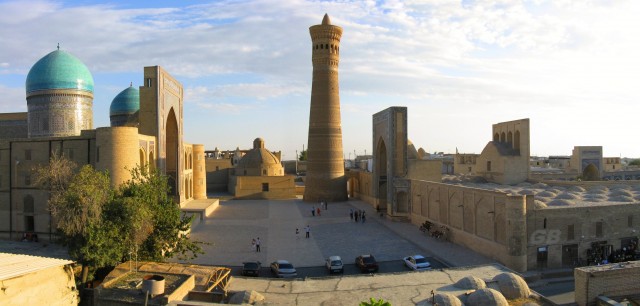Bokkara
BOKKARA (ALSO BUKHARA) is a city that lies on the SILK ROAD of Central Asia in the Asian republic of UZBEKISTAN. Its name, bestowed by its Sogdian occupiers in the 3rd century B.C.E., derives from the Sanskrit word vikhara, meaning “monastery.” Bokkara lies in the ARAL SEA basin and was founded some 3,000 years ago by the Persian Prince Siyavush of the Syavushid dynasty on a hill in the Kyzl Kum, a desert region in the northern foothills of the Pamir/TIAN SHAN MOUNTAINS. It enjoys a continental climate of cold winters and hot summers. The annual temperature regime varies from 5 degrees F (-15 degrees C) in January to 126 degrees F (52 degrees C) in July and receives less than 8 in (20 cm) of precipitation per year.
Culturally, Bokkara has experienced many influences because of its location at the crossroads of Asia. The Achaemenids of Persia captured Bokkara 2,600 years ago, it was taken by Alexander the Great in 329 B.C.E., and then by the Sogdians from the Fergana and Zerafshan valleys to the east. At this time, Zoroastrianism, a belief system involving fire worship, was practiced. However, with the arrival of the Arabs, the city changed and ISLAM was introduced.

ISLAMIC LEGACY
This Islamic legacy is apparent today in the form of mosques, madrassas (Islamic schools), and the minarets, palaces, and mausolea of the ruling elite and their successors, the Samanid dynasty. In the early 13th century, the Mongols, led by Genghis Khan, invaded and destroyed much of Bokkara. In 1500, the Uzbek people claimed Bokkara, routing the descendents of the great Tamar (also Amir Timur and Tambulaine) who had established his capital at SAMARQAND in the early 1400s.
The decorative arts were encouraged, especially miniatures, and the restoration of Bokkara's ruined buildings commenced. The city benefited from overland intercontinental trade as commerce was established between eastern Asia and western Europe. Various wars and rivalries then led to a decline in the city's fortunes until the 1800s when British and Russian interests were revived as they vied for influence and attempted to reestablish trade.
SOVIET ERA
Tzarist interests caused another twist in Bokkara's history, and that of the region in general. Russian interest intensified, though Bokkara never formally became part of the empire until the advent of the Soviet era in 1924, when Uzbekistan, as a political unit of the soviet union, was created. Cultural change was generated through education, but the underlying traditions of Bokkara were never extinguished. Commerce and trade remained important and Islam remained the chief religious influence. Even though many of the ancient mosques were closed by the Soviets, they were not destroyed. Today, in the independent, post-Soviet era, the monuments associated with Bokkara's rich history provide the attraction for a growing tourist industry, and many are working mosques once again.